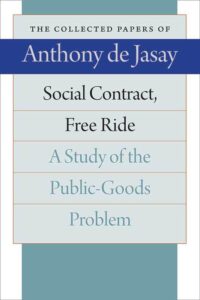
Classical liberals tend to be big fans of the argument from evolution. To say that a particular social tradition or market outcome was the result of an evolved process, or an emergent outcome, or a spontaneous order, is to establish a sort of strong presumption in favor of its legitimacy or usefulness. This isn’t meant to be an absolute proof, of course, but it does serve to shift the burden of proof strongly to the advocate of overturning the evolved order.
Yet, some on the political left think there is a contradiction in this approach. Classical liberals and libertarians, they point out, are often extremely skeptical and critical of various political institutions like the FDA or the Labor Department. And yet, they argue, these institutions themselves are part of the evolved political order, emerging over time just as market outcomes or social traditions emerge. Shouldn’t this grant these political institutions the same presumption of legitimacy or usefulness that classical liberals grant in these other cases?
Short answer, no.
But on the off chance you’re interested in a longer answer, let’s shift gears for a second and talk about memes.
I don’t mean memes as the term is usually used today, meaning something like “a picture on the internet with a funny caption.” I mean memes as the idea was originally described by Richard Dawkins – a way to model the spread of ideas as though ideas themselves were alive and used human minds to replicate themselves. If you have a handful of minutes to spare, this video does an excellent job describing how the process works, although rather than using the term “meme” it instead refers to “thought germs.” But the idea is the same.
What does memetic theory have to do with why the argument from evolution doesn’t apply to political institutions the way it applies to market processes or social traditions? Because it highlights a key point James Buchanan made – specifically, Buchanan’s point about how order is defined by the process of its emergence.
This means simply pointing out than an order is emerged or evolved doesn’t have the same implications in all cases. It’s also important to consider the process of evolution which brought that order about in the first place. Different orders evolve under different selection pressures, which is why orders that emerge under a system of public choice will evolve according to a systematically different logic than those evolving under private choice.
In the case of memetic theory, ideas most successfully reproduce themselves (that is, are more likely to be shared and spread) when they are emotionally engaging, and especially when they inspire anger. There is no reason to believe, and excellent reasons to doubt, that an evolutionary pressure that causes the most anger-inducing ideas to spread will also produce the ideas that most accurately reflect reality. The fact that an idea has been highly successful at evolving under mimetic evolutionary pressures, especially in the age of social media, gives a strong presumption in favor of discounting its reliability. And the same is true for the evolutionary logic under which state institutions evolve.
Anthony de Jasay, in his book Social Contract, Free Ride explains why the argument from evolution (Institutional Darwinism, in his terms) follows a similarly unhappy logic when applied to institutions of the state. He argues that the evolutionary pressures of state institutions create a sort of Institutional Gresham’s Law, where ineffectual and inefficient institutions drive out effective and efficient ones:
Thomas Sowell gave a real-world example of this process when he was interviewed by Salon magazine years ago. He described how early in his career he was working for the federal government, trying to figure out if high unemployment in Puerto Rico was due to minimum wage laws or hurricanes damaging the local sugar crops. He worked out a way to test the competing ideas and reported it to his superiors. This is how he describes their reaction:
I expected to be congratulated. And I saw these looks of shock on people’s faces. As if, “This idiot has stumbled on something that’s going to blow the whole game!” To me the question was: Is this law making poor people better off or worse off?
That was the not the question the labor department was looking at. About one-third of their budget at that time came from administering the wages and hours laws. They may have chosen to believe that the law was benign, but they certainly weren’t going to engage in any scrutiny of the law.
This is an example of institutional Gresham’s Law at work. Given that so much of the Labor Department’s budget is for the purpose of carrying out wage and hour laws, institutional Darwinism would select in favor of a version of the Labor Department that protected their budget by ignoring harm caused by the laws they administered and select against a version of the Labor Department that did the opposite. Similarly, versions of the TSA or FDA that overhype minor or imaginary risks will be selected over versions operating according to a more realistic assessment of risk requiring a lighter touch and a smaller budget.
To bring it back to that line from James Buchanan again, order is defined by the process of its emergence. The outcomes of economic competition in a free market operate by a different evolutionary logic than the spread of thought germs, or by the evolution of political institutions. You can’t simply import the argument used for social and economic evolution and apply it to state institutions. Well, I suppose you can, but when that move falls totally flat, you’ll at least know why.


READER COMMENTS
Richard W Fulmer
Mar 17 2023 at 3:24pm
That something evolved is not proof that it is beneficial or even benign. Cancer is a product of evolution.
Mactoul
Mar 18 2023 at 8:21am
If acceptable order is that produced under free market conditions, then I wonder if any social order would ever pass this criterion.
When did free market hold?
In middle Ages, during Renaissance, during 18-19 c?
Only the political development of strong centralized states led to the modern state riding roughshod over local customs and create a free market— compare France under Louis XVI — trying to modernize– and the strong central government post- French Revolution that created the modern French state.
Ron Browning
Mar 18 2023 at 9:27am
Just as important as how an order has come into being, is how order may currently evolve. State force is relatively ineffective regarding the evolution of language, cuisine and couture, etc. While State force may prescribe hiring quotas, for example, and may proscribe certain types of “discrimination”, these practices will rarely survive once the force is removed. A certain legitimacy can be conferred on any practice that has come into being without State force, assuming that it will continue to evolve without the influence of State force. It would be an illegitimate use of language to describe a practice that survives only thru the use of State force as possessing legitimacy.
Mactoul
Mar 18 2023 at 10:18pm
Political boundaries strongly correlate with language boundaries. Like between France and Germany, between Germany and Poland. And numerous instances worldwide.
So either states follow languages or the languages follow states.
Construction of languages itself depended upon states. Example construction of the French language from prevailing languages due to power of the French state.
Walter Boggs
Mar 18 2023 at 1:32pm
I admit I’ve never heard of the claim that governmental institutions can be the result of evolved or emergent order. From what I know about the meaning of emergent order, its results would have to be continually tested through competition. I can’t recall a state agency ever having to face that kind of test, probably because only government gets to control the kinds of competition that can exist.
Interesting piece, thanks.
Comments are closed.